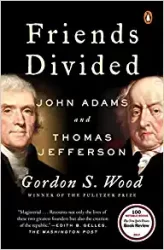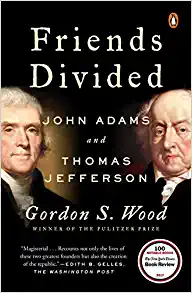A Nation Divided
Vicious partisanship. A vitriolic press. Fistfights, skirmishes and violent clashes. Foreign interference in domestic politics. A crackdown on immigrants. States defying federal law. A bitterly contested election. An unpopular one-term President ousted.
That was the United States from 1792-1800.
Our nation was small and weak then, a precarious vessel tossed about on stormy seas, steered by a new constitution and a shaky new form of government.
Thomas Jefferson and John Adams were the opposite poles of the times. Jefferson penned the Declaration of Independence and championed liberty and equality. Adams thought America needed a modicum of monarchy and aristocracy, much like England.
When George Washington was President, Vice President Adams pressed the Senate to come up with an appropriate form of address. They settled on “His Highness the President of the United States of America, and Protector of Their Liberties.”
Critics promptly dubbed Adams “His Rotundity.”
Washington, wisely, went with “Mr. President.”
When Adams was President (1797-1801), Vice President Jefferson – elected separately then – led what became the Democratic-Republican Party and rallied opposition to the Alien and Sedition Acts, aimed at “expelling aliens and stifling the scurrility of the Republican press.”
The Sedition Act made it a crime to “write, print, utter or publish” anything “false, scandalous or malicious” that brought the president or members of Congress “into contempt or disrepute.”
Everybody at Fox News would be in prison.
Adams lost reelection to Jefferson in “the Revolution of 1800.” The Democratic-Republicans immediately set about repealing the Acts and removing from office Federalist judges appointed by Adams at the eleventh hour.
In the long term, too, Jefferson’s vision of America – “all men are created equal” – prevailed. We even expanded his declaration to include all people, regardless of race or gender. (Well, most of us agree on that. Or many of us.)
As Gordon S. Wood writes, “As Lincoln grasped better than anyone, Jefferson offered Americans a set of beliefs that through the generations have supplied a bond that holds together the most diverse nation that history has ever known. Since now the whole world is in the United States, nothing but Jefferson’s ideals can turn such an assortment of different individuals into the ‘one people’ that the Declaration of Independence says we are. To be an American is not to be someone, but to believe in something. And that something is what Jefferson declared.
“That’s why we honor Jefferson and not Adams.”
“Friends Divided: John Adams and Thomas Jefferson,” by Gordon S. Wood. https://www.amazon.com/Friends-Divided-Adams-Thomas-Jefferson/dp/0735224714

A Nation Divided

Vicious partisanship. A vitriolic press. Fistfights, skirmishes and violent clashes. Foreign interference in domestic politics. A crackdown on immigrants. States defying federal law. A bitterly contested election. An unpopular one-term President ousted.
That was the United States from 1792-1800.
Our nation was small and weak then, a precarious vessel tossed about on stormy seas, steered by a new constitution and a shaky new form of government.
Thomas Jefferson and John Adams were the opposite poles of the times. Jefferson penned the Declaration of Independence and championed liberty and equality. Adams thought America needed a modicum of monarchy and aristocracy, much like England.
When George Washington was President, Vice President Adams pressed the Senate to come up with an appropriate form of address. They settled on “His Highness the President of the United States of America, and Protector of Their Liberties.”
Critics promptly dubbed Adams “His Rotundity.”
Washington, wisely, went with “Mr. President.”
When Adams was President (1797-1801), Vice President Jefferson – elected separately then – led what became the Democratic-Republican Party and rallied opposition to the Alien and Sedition Acts, aimed at “expelling aliens and stifling the scurrility of the Republican press.”
The Sedition Act made it a crime to “write, print, utter or publish” anything “false, scandalous or malicious” that brought the president or members of Congress “into contempt or disrepute.”
Everybody at Fox News would be in prison.
Adams lost reelection to Jefferson in “the Revolution of 1800.” The Democratic-Republicans immediately set about repealing the Acts and removing from office Federalist judges appointed by Adams at the eleventh hour.
In the long term, too, Jefferson’s vision of America – “all men are created equal” – prevailed. We even expanded his declaration to include all people, regardless of race or gender. (Well, most of us agree on that. Or many of us.)
As Gordon S. Wood writes, “As Lincoln grasped better than anyone, Jefferson offered Americans a set of beliefs that through the generations have supplied a bond that holds together the most diverse nation that history has ever known. Since now the whole world is in the United States, nothing but Jefferson’s ideals can turn such an assortment of different individuals into the ‘one people’ that the Declaration of Independence says we are. To be an American is not to be someone, but to believe in something. And that something is what Jefferson declared.
“That’s why we honor Jefferson and not Adams.”
“Friends Divided: John Adams and Thomas Jefferson,” by Gordon S. Wood. https://www.amazon.com/Friends-Divided-Adams-Thomas-Jefferson/dp/0735224714